CWEH Activists Blog: 26 January 2018
Carol Yong
For as long as Carol Yong can remember, many of her rural indigenous friends in Sarawak practising subsistence agriculture mixed with smallholdings of cash crop have been marginalised and censured for their “unproductive” use of land by the logic of the state politics of land development. Now suddenly they may get some attention, starting with strong condemnation of the recent EU Parliament decision on palm oil discriminatory to Malaysia’s smallholders. Since the general elections is looming, she finds it no surprise that this vote-wooing effort is heightened.
All images and text are copyright of Carol Yong.
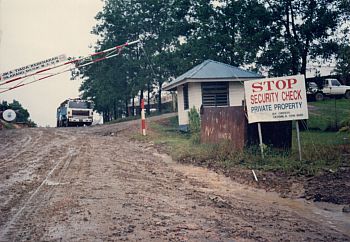 Who is the threat for big oil palm plantations?
Who is the threat for big oil palm plantations?
The European Parliament decided on 17 January to ban palm oil from biofuels by 2021.[1] The immediate reaction of the Malaysian government through the Minister of Plantation Industries and Commodities (MPIC): “crop apartheid”, emphasising the effect on the Malaysian palm oil industry and its smallholders.
Over the days more MPIC statements on who will suffer the most – Malaysian small farmers with their cultivation of small plots of oil palm. Stressing smallholders affected but not large palm oil companies and corporations which are equally or presumably the worst affected by the EU ban, begs the question: why are smallholders so important this time?
Looking back
Between July and October 2015, millions of people in Southeast Asia were choking on transboundary haze fires and smoke, particularly in Indonesia, Malaysia, and Singapore. The Indonesian government blamed both large companies and small-scale farmers for burning peatlands and creating the dense and acrid smoke. In Malaysia, it was convenient to blame the independent family-based farmers and smallholders for slash-and-burn agriculture and oil palm, to divert bad publicity away from big plantations.
If we look at past positions taken by the Malaysian governments on smallholdings, the call has consistently been for independent landowners holding land titles or customary lands to abandon traditional farming (usually mixed planting of crops for own consumption and other cash crops), and to participate in large-scale commercial plantations.
Malaysia is the world's second-biggest palm oil producer after Indonesia, and the two countries together produce nearly 90% of global output. Palm oil exports is a key source of revenue for Malaysia, with the European Union its No. 2 export market after India. Thus the keenness of both federal and state governments in the oil palm industry.
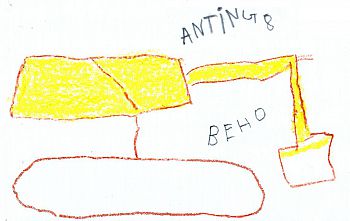 The beho, lori antu (devil lorry), excavator, which indigenous children know what it does to their forests and farmlands
The beho, lori antu (devil lorry), excavator, which indigenous children know what it does to their forests and farmlands
A succession of governments in Sarawak has blamed the indigenous Dayak rural communities for still living in poverty because of unproductive land use of their native customary rights (NCR) lands from their ancestors. This spurred the Sarawak Government under Taib Mahmud to moot the “politics of development” aimed to eradicate poverty, provide employment and bring progress to the rural areas where the indigenous peoples generally are. In 1996 Taib engineered the “New Concept” (Konsep Baru) land development policy to boost the privatisation of lands for commercial plantation in Sarawak. The most favoured plantation crop is the “golden crop”, oil palm.
A simple translation of Konsep Baru would be …
Native landowners are expected to surrender their lands to the State for 60 years, to be held in trust for them by an appointed state agency. Amalgamate the NCR lands into land banks, issue a master title and lease to a joint venture company (JVC) for oil palm for a period of 60 years. A state agency and private local or foreign plantation companies with markets, technical, management expertise and financial clout form the JVC. On expiry of the lease, native landowners can apply to reclaim their lands.
In practice…
The 60 years time span is elastic as leases often are renewed or restarted when the corporate ownership changed. The landowners have little or no say nor the right to sit on the JV Board. The bulldozers often cleared fields beyond the JV boundaries without permission or consultation of farmers, damaging their plots already planted or left idle for soil rejuvenation. Crucially, the land rights of communities are uncertain and recovery of their land is never guaranteed.
You see, during only three decades under Taib’s government, Sarawak’s land and forests laws and policies were subjected to continuous amendments and changes that he claimed were mostly for the better to improve the lives of his people and the nation.
Folks versus the State: A view from inside out
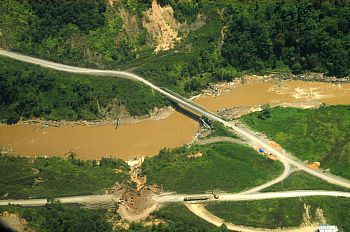 Logging roads and polluting river with damaged slopes, Sarawak (Pic: SACCESS)
Logging roads and polluting river with damaged slopes, Sarawak (Pic: SACCESS)
In the 1980s I met some important groups of Orang Ulu (upland indigenous peoples) of Sarawak in the capital city, Kuala Lumpur. They came at different times to see MPs, politicians, NGOs to hand over thumbprinted and signed petitions, complaints and reports on victimisation by loggers and the likes, with the tacit backing of state authorities. They also told the wider audience that if they did not fight for the very basic of life like shelter, lands, food, natural resources, all would be drowned by the mega Bakun Hydroelectric Dam project, albeit logging activities had already degraded much of their forests and natural resources.
I spent over three years during early 1990s living in Sarawak and working with an NGO and indigenous communities, experiencing their situations first hand. My understanding of partícularly the importance of NCR rights for maintaining their indigenous identity, way of life, cultural and spiritual traditions, community structure and self-determination became more grounded over time.
I saw continuing and increasing state control over the customary lands and forests of indigenous peoples. Laws and rules being enforced more strictly and extend even to tacit backing for corporation employed armed thugs, etc. to threaten or persecute women, men and children defending their lands and forests. As well, gross violations of social, economic and cultural rights of many indigenous communities. For instance, on the one hand, Dayak and Orang Ulu communities practising rotational subsistence agriculture were pressured to give up their lands for large plantation development schemes, while on the other, nomadic hunter-gatherers such as the Bhukets and Eastern Penans were “advised” to change to a settled or semi-settled way of life with smallhold farms and animal husbandry, espoused as indicators of modernity. Try asking the once nomadic Penans and the answer would likely be “what can we do?” since depending on rainforests for survival is not easy anymore due to devastated forests and environment through logging by giant concessionaires. Many others, forcibly displaced by dams, have been relocated to unfamiliar environments in resettlement schemes. For many indigenous communities affected directly or indirectly by big plantations, logging, dams, mining and so on, the common struggle is to regain control over their traditional territories and customary lands, political autonomy and other rights.
No room for “troublemakers”
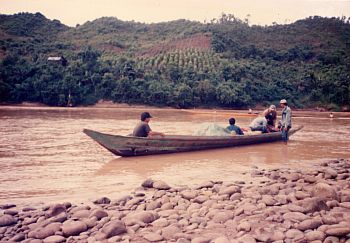 Large-scale logging and plantation activities in Sarawak polluted many rivers thus affecting also fishing activities of the indigenous communities living along river banks
Large-scale logging and plantation activities in Sarawak polluted many rivers thus affecting also fishing activities of the indigenous communities living along river banks
The mainstream media is either owned or controlled by the government, and shamelessly used to make society be frightened of the opposition and targeted NGOs, activists and indigenous peoples organisations, all painted as troublemakers and conduits of anti-government instigators “from outside” (western). Create paranoia to cover up state and corporate vested interests linked directly to the profits of the logging industry and other state-imposed development projects (e.g. palm oil plantations, mega-dams, mining) occurring on native lands without their consent?
In many areas, the expansion of the palm oil industry has resulted in conflicts that still continue to this day, between the large palm oil industry (private and state) players and the indigenous peoples. Hundreds of native landowners have filed cases in courts. Data compiled by NGOs based on legal firms record on “Sarawak NCR Land Dispute Cases Involving Logging and Other Issues“ revealed that more than 70 cases from over 200 disputes pending in Sarawak courts over NCR, directly involve large oil palm developers.
Now I want to tell you about my experience 20 years ago, in June 1997, when I was stopped by immigration authorities at the Miri Airport in northern Sarawak. A notice was handed to me on-the-spot, declared me persona non grata and an exit from the state within 24 hours.[2] I showed them the official research permit issued by the State Planning Unit (SPU) of the Chief Minister’s Department to prove I came for my master’s research in the Bukit Peninjau Resettlement Scheme. My fieldwork site was also the settlement-cum-oil palm scheme for over 3,000 indigenous Ibans displaced in 1981 by the Asian Development Bank (ADB) funded Batang Ai dam project. They ignored it. The entry ban forced me to switch my research topic and fieldwork site to the neighbouring Borneon state of Sabah (see my earlier posting on this blog). Until today, my entry ban, like many others, is neither lifted nor an official reason given, but everyone was convinced it was politically motivated.[3]
I knew this invisible political hand at play to protect vested interests too well. Just two months earlier, in April, the SPU invited me to join the state Ministry of Land Development and the Natural Resource and Environment Board (NREB) delegation on-site visits to several palm oil plantations in Miri and Bintulu. Golden opportunity to collect preliminary data. My camera was capturing the vast hectares of oil palm and “hospitality” dinners in expensive restaurants as the hosts - the company directors, talked about their applications for an extension to their near-expiring leases with the officials. It was likely too that my direct participation in many indigenous people's peaceful anti-logging protests and court cases filed to settle disputes led the Sarawak government to blacklist me.
Vote-wooing smallholders
The Sarawak authorities did not prohibit large monoculture plantations of oil palm operating within indigenous territories, but prohibited my academic research, which was, in fact, with backing of a federal government stipend and a state government permit. I was frustrated but not baffled.
Combining scholarly perspective with the passionate eye being direct participant of the activists' movement itself, my proposed fieldwork set against the Bukit Peninjau resettlement scheme was not merely to fulfil the degree requirement, but more importantly to interrogate the state ideology of politics of development. An ideology that resulted in many indigenous peoples’ loss of customary lands, displaced as subsistence farmers, resettled to large-scale plantations, and with a majority ended up as lowly paid labourers for oil palm plantation companies. I wanted to raise urgent questions on the perspective of the government that smallholders are inefficient yet not doing large-scale planting which is more effective.
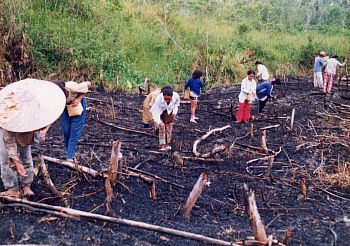 Dayak women bergotong royong (collective labour) in planting paddy
Dayak women bergotong royong (collective labour) in planting paddy
To native landowners: they have been self-sustaining without the need of converting their lands into a sea of palm oil. They have farmed and lived off the land growing rice and other food crops to feed themselves, their families and their communities, alongside cultivated cash crops such as rubber and oil palm for sale and gathering non-timber forest products for domestic use and sale. In short, smallholders are the ones having mixed crops that are more environmentally sound, more centred on local needs, more secured food base and less vulnerable to market fluctuations. If the price of one crop falls, say, rubber, they have other crops to cushion them, and so provide diverse opportunities for income generation to men and women alike.
The privatisation of native lands to big companies increases the state authority in deciding on land use and types of crops to be planted, thus undermining family farms and smallholders. Smallholders used to dominate the agriculture sector. With the onslaught of large scale plantations, however, the smallholders are gradually becoming marginalised farmers, and the majority of women are in this category
Now suddenly the government is speaking for smallholders, more precisely, the oil palm smallholders, including promises of going all out to help them. The Deputy Chief Minister of Sarawak even encouraged oil palm growers in Sarawak, especially independent smallholders to diversify their economic activities for more sources of income. This is a sharp shift in their position from over several decades when smallholders were heavily criticised for unproductive land use and as inefficient small diversified farmers.
To counter lobbyists’ attacks that palm oil plantation development in Malaysia is a major driver of deforestation and human rights abuses, and the “crop apartheid” crisis for Malaysia, women have also been used to woo the smallholders. A local indigenous woman leader has come to the forefront claiming to represent “the interests of indigenous smallholders in the palm oil industry”, and to speak out against NGOs that "threaten their livelihood" by attacking palm oil.
In the run-up to the upcoming general elections, this show of a “caring government" is particularly important in the semi-rural and rural areas to make an impact for this large but marginalised group of smallholders, whom for a long, long time their existence have not been so salient.
Otherwise, how can one explain the increasing attention to champion the needs of the smallholders, including the indigenous woman cited above? As my Sarawak activist friend with political astuteness said: Her story would look serious for outsiders,[4] but do a careful internet search and you get her as a potential woman candidate for the ruling coalition BN”.
Back to CWEH Activists Blog main page
[1] See, http://www.euractiv.com/section/agriculture-food/news/eu-parliament-ends-palm-oil-and-caps-crop-based-biofuels-at-2017-levels/
[2] I am not an isolated case. In the past few decades, activists, journalists and leaders/members of opposition political parties labelled “troublemakers” by the Sarawak government have been denied entry into Sarawak, and now the Sabah government also follow suit.
[3] A Malaysian banned from entering a state within the country may be unknown outside Malaysia and even unthinkable. It is true as this constitutes a violation of a citizen’s human rights – the right to freedom of movement. But the blatant abuse of state power to arbitrarily impose a ban on Malaysian citizens from entering or leaving another state, particularly Sarawak and Sabah, is still going on. Here is an example: http://www.malaysiakini.com/news/171940 04.08.11, Ambiga fails to challenge S'wak deportation order.


